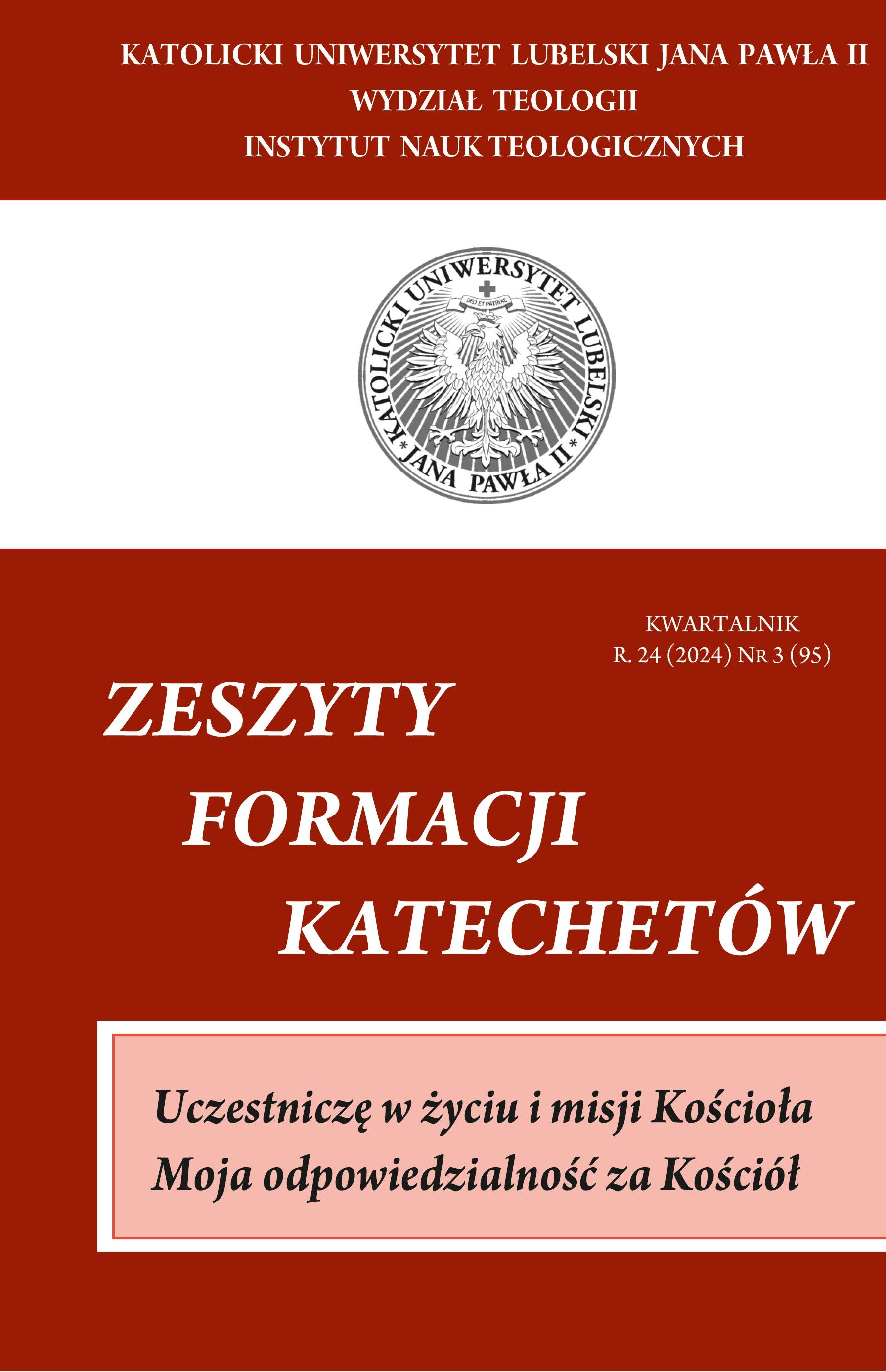My responsibility for the Church
Keywords:
Jesus Christ, responsibility, Church, community, parishAbstract
This article shows how important an element that builds responsibility is caring for the Church. According to the teachings of the Second Vatican Council, the Church does not identify itself with a political community, is not associated with any political system, and is not one of many parties or social organizations. Hence, the responsibility of the Church cannot be reduced to concern for the achievement of only temporal human goals, and vice versa, care and responsibility for the Church cannot be reduced only to the issue of religious practice. The specificity of the Church and its mission results from the theandric nature of the Church, which is focused on eschatological fulfillment. The Church still remembers Christ’s call: “seek first the kingdom of God and his righteousness, and all these things will be added to you” (Mt 6:33). Man’s responsibility in the Church is born from astonishment at the greatness of his dignity and from accepting the gift of the admonishing Spirit speaking to the Churches. This always takes place in the encounter of a human person with God the Redeemer. A mature, properly formed person is characterized by his degree of responsibility and how he exercises it in his life. Responsibility for oneself and one’s loved ones is also expressed in responsibility for the Church community in a broad sense. As Antoni Nadbrzezny states: “God is not a threat to human freedom. In the saving dialogue, the Church discovers the truth that man and God are united by mutual responsibility, which is the second name of love”.
References
„Biblia Tysiąclecia” – Pismo Święte Starego i Nowego Testamentu, Poznań 2003.
Adamczyk D., Odpowiedzialność świeckich w Kościele i świecie – w świetle adhortacji
apostolskiej Jana Pawła II „Christifideles laici”, „Zeszyty Formacji Katechetów”, 66(2017), nr 2, s. 52-65.
Biel R., Ku Kościołowi służby, w: Socjalizacja – wyzwanie współczesności, red. J. Stala, Tarnów 2010, s. 159-169.
Jan Paweł II, Christifideles laici, Watykan, 30 grudnia 1988 r.
Jan Paweł II, Evangelium vitae, Watykan, 25 marca 1995 r.
Jan Paweł II, Familiaris consortio, Watykan, 22 listopada 1981 r.
Jan Paweł II, Sollicitudo rei socialis, Watykan, 30 grudnia 1987 r.
Kard. Grzegorz Ryś: Kościół musi być synodalny, bo inaczej nie wypełni swej misji, https://www.ekai.pl/kard-grzegorz-rys-kosciol-musi-byc-synodalny-bo-inaczej-nie-wypelni-swejmisji/, dostęp online: 15.07.2024.
Katechizm Kościoła Katolickiego, Poznań 1994.
Kowalski J., Odpowiedzialność moralna, w: Wielka encyklopedia nauczania Jana Pawła II, pr. zbior., Radom 2014.
Mazurkiewicz P., Jaką misję w Kościele mają świeccy?, https://www.ekai.pl/jaka-misje--maja-w-kosciele-swieccy/, dostęp online: 14.07.2024.
Nadbrzeźny A, „Eklezjologia odpowiedzialności”. Z namysłu nad encykliką „Redemptorhominis”, „Roczniki Teologii Dogmatycznej”, 1(2009), s. 31-44.
Odpowiedzialność w myśli bł. Jana Pawła II, https://www.niedziela.pl/artykul/8758/Odpowiedzialnosc-w-mysli-bl-Jana-Pawla-II, dostęp online: 16.07.2024.
Sobór Watykański II, Lumen gentium, Watykan, 18 listopada 1964 r.
Stelmasiak A., Na co idzie taca?, https://www.niedziela.pl/artykul/61426/nd/Na-co-idzie--taca, dostęp online: 12.07.2024.
Świeccy też są odpowiedzialni za Kościół, https://papiez.wiara.pl/doc/2725250.Swieccy--tez-sa-odpowiedzialni-za-misje-Kosciola, dostęp online: 14.07.2024.
Wojtyła K., Osoba i czyn, Kraków 1985.
Downloads
Published
How to Cite
Issue
Section
License
Copyright (c) 2024 The Journals of Catechetical Formation

This work is licensed under a Creative Commons Attribution-NonCommercial-NoDerivatives 4.0 International License.

